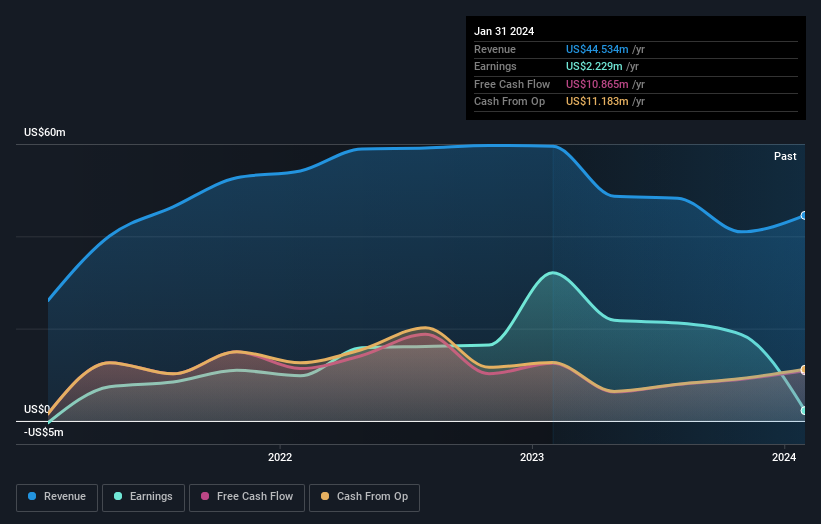AMREP Corporation's (NYSE:AXR) institutional shareholders had a great week as one-year returns increased after a 10% gain last week
Key Insights
Significantly high institutional ownership implies AMREP's stock price is sensitive to their trading actions
A total of 5 investors have a majority stake in the company with 50% ownership
To get a sense of who is truly in control of AMREP Corporation (NYSE:AXR), it is important to understand the ownership structure of the business. And the group that holds the biggest piece of the pie are institutions with 47% ownership. Put another way, the group faces the maximum upside potential (or downside risk).
And as as result, institutional investors reaped the most rewards after the company's stock price gained 10% last week. The one-year return on investment is currently 5.9% and last week's gain would have been more than welcomed.
Let's delve deeper into each type of owner of AMREP, beginning with the chart below.
See our latest analysis for AMREP
What Does The Institutional Ownership Tell Us About AMREP?
Institutional investors commonly compare their own returns to the returns of a commonly followed index. So they generally do consider buying larger companies that are included in the relevant benchmark index.
We can see that AMREP does have institutional investors; and they hold a good portion of the company's stock. This can indicate that the company has a certain degree of credibility in the investment community. However, it is best to be wary of relying on the supposed validation that comes with institutional investors. They too, get it wrong sometimes. It is not uncommon to see a big share price drop if two large institutional investors try to sell out of a stock at the same time. So it is worth checking the past earnings trajectory of AMREP, (below). Of course, keep in mind that there are other factors to consider, too.
We note that hedge funds don't have a meaningful investment in AMREP. The company's largest shareholder is Albert Russo, with ownership of 16%. With 12% and 10% of the shares outstanding respectively, James Dahl and Robotti & Company, Incorporated are the second and third largest shareholders. Furthermore, CEO Christopher Vitale is the owner of 1.9% of the company's shares.
To make our study more interesting, we found that the top 5 shareholders control more than half of the company which implies that this group has considerable sway over the company's decision-making.
While studying institutional ownership for a company can add value to your research, it is also a good practice to research analyst recommendations to get a deeper understand of a stock's expected performance. As far as we can tell there isn't analyst coverage of the company, so it is probably flying under the radar.
Insider Ownership Of AMREP
While the precise definition of an insider can be subjective, almost everyone considers board members to be insiders. Management ultimately answers to the board. However, it is not uncommon for managers to be executive board members, especially if they are a founder or the CEO.
I generally consider insider ownership to be a good thing. However, on some occasions it makes it more difficult for other shareholders to hold the board accountable for decisions.
Our most recent data indicates that insiders own a reasonable proportion of AMREP Corporation. It has a market capitalization of just US$101m, and insiders have US$42m worth of shares in their own names. It is great to see insiders so invested in the business. It might be worth checking if those insiders have been buying recently.
General Public Ownership
With a 11% ownership, the general public, mostly comprising of individual investors, have some degree of sway over AMREP. While this size of ownership may not be enough to sway a policy decision in their favour, they can still make a collective impact on company policies.
Next Steps:
It's always worth thinking about the different groups who own shares in a company. But to understand AMREP better, we need to consider many other factors. For example, we've discovered 2 warning signs for AMREP that you should be aware of before investing here.
Of course, you might find a fantastic investment by looking elsewhere. So take a peek at this free list of interesting companies.
NB: Figures in this article are calculated using data from the last twelve months, which refer to the 12-month period ending on the last date of the month the financial statement is dated. This may not be consistent with full year annual report figures.
Have feedback on this article? Concerned about the content? Get in touch with us directly. Alternatively, email editorial-team (at) simplywallst.com.
This article by Simply Wall St is general in nature. We provide commentary based on historical data and analyst forecasts only using an unbiased methodology and our articles are not intended to be financial advice. It does not constitute a recommendation to buy or sell any stock, and does not take account of your objectives, or your financial situation. We aim to bring you long-term focused analysis driven by fundamental data. Note that our analysis may not factor in the latest price-sensitive company announcements or qualitative material. Simply Wall St has no position in any stocks mentioned.
Have feedback on this article? Concerned about the content? Get in touch with us directly. Alternatively, email editorial-team@simplywallst.com

 Yahoo Finance
Yahoo Finance 

